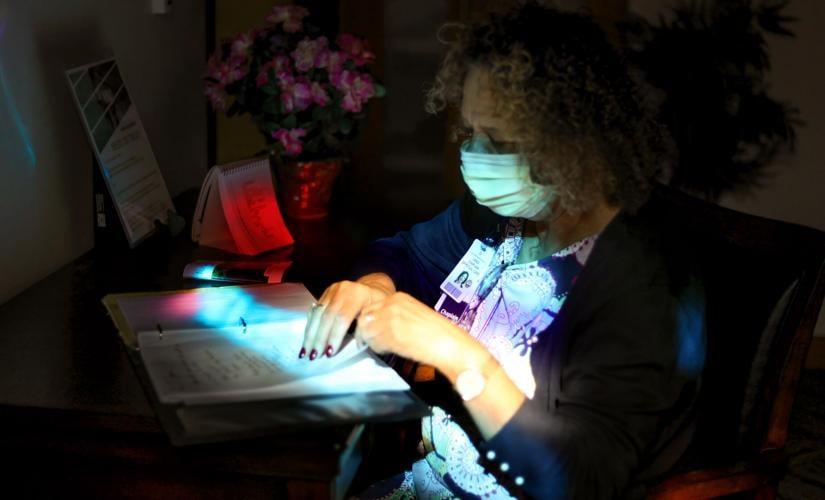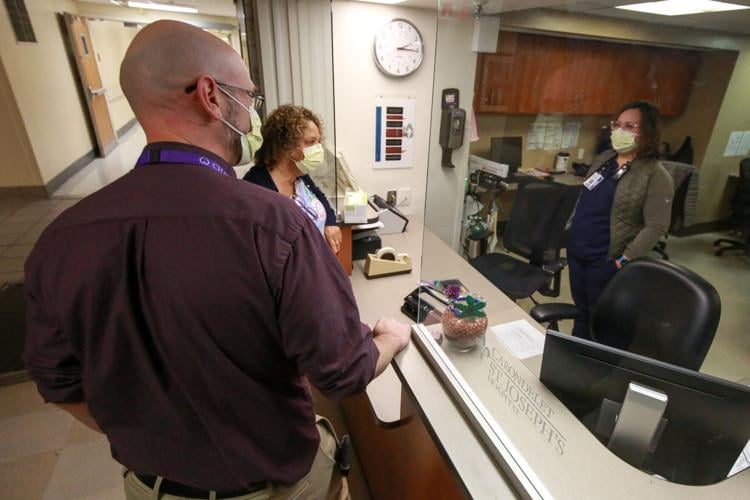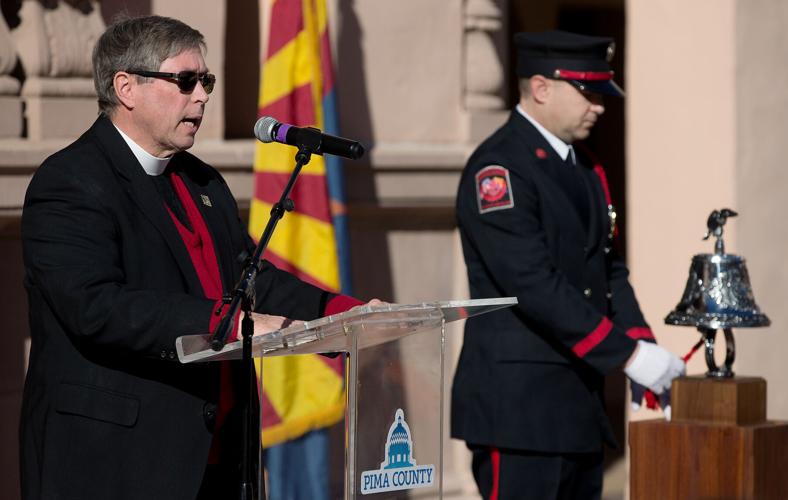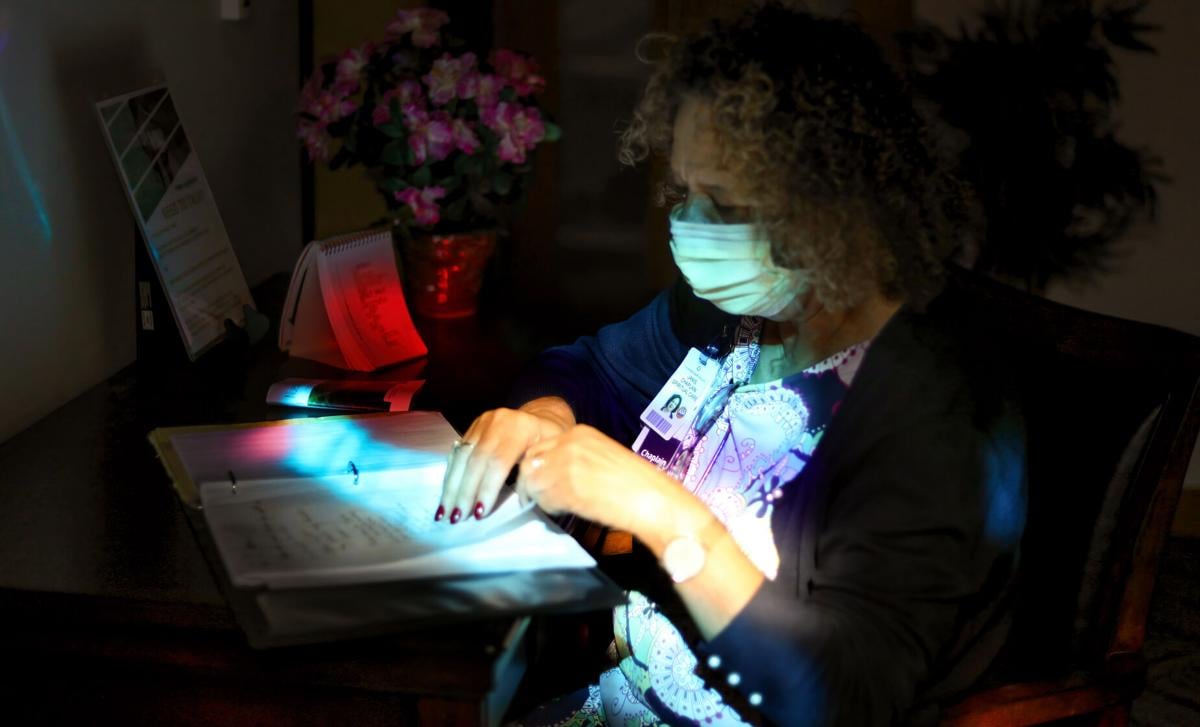Staff chaplains have long been a mainstay of care within a hospital, the people who comfort family members, assist the dying and offer support to medical staff when the day, or the week, has been overwhelming.
Since the pandemic started 19 months ago, the bad days and hard weeks have been abundant. Hospital chaplains in Pima County are doing what they can to hold up nurses, doctors and respiratory therapists caring for the community.
These spiritual guides also stand with grieving family members — but frequently not at a patient’s bedside, as they would in normal times.
The final hours for family members of COVID-19 patients are now often observed from adjacent parking lots and outdoor hospital patios, as clergy assist with goodbyes said through windows and prayers recited through smartphones.
The usual calls to find, perhaps, a beloved rabbi, priest or imam to ensure a patient’s last rituals are completed are now often answered through a phone call or a video screen if the patient's illness makes them inaccessible to anyone but medical staff.
Other times, chaplains suited in protective equipment attend at a COVID-19 patient’s bedside, putting their lives at risk along with the nurses, doctors and respiratory therapists who tend to those terminally ill from COVID-19.
“We’ve seen so much loss,” said Travis Williams, who works as a chaplain with Carondelet St. Mary’s and St. Joseph’s hospitals.
Now, with the latest COVID-19 surge underway and the holidays starting, the job Williams and dozens of others do will remain busy and heartbreaking as they continue to cope with a health crisis that was impossible to imagine just two years ago.
“Three of the four of us were here through Jan. 8. What could be worse than that?” said Banner Health Chaplain Joseph Fitzgerald. He was referring to that day in 2011 when a gunman opened fire outside a Safeway and six people died and the 13 who were injured were treated at Banner - University Medical Center Tucson.
“Well, wait long enough and something will come along,” Fitzgerald said.

Chaplain Joseph Fitzgerald, left, chaplain at Banner -University Medical Center Tucson, reads off the names of those killed and wounded at the January 8th mass shooting in 2011, during a ceremony in 2020.
That something, COVID-19, is again causing patient counts in hospitals to come near to crisis levels. As of Tuesday, Nov. 23, only 3% of beds in intensive care units in the county were available.
At the same time, the number of ventilators being used by COVID patients was up to 48% of the county’s supply. There are more ventilators in storage, but the county’s health director, Dr. Theresa Cullen, is concerned there won’t be enough hospital staff to operate them.
Williams said that as the pandemic continues, he worries about losing dedicated medical professionals, especially those who started their careers during the pandemic and have never worked at a hospital during normal times.
“It’s so hard not just to see what it’s been like for the families, but how hard it’s been on the staff,” he said.
The outpouring of support that was there during the early months has dissipated, he said, and that’s made it harder now, too.
“The people who are here now are the same people we were rallying around and calling heroes a year and a half ago,” he said. “They still need the help, they still need the same respect.”
Fitzgerald works with three other chaplains through Banner Health and, along with Williams, is one of dozens doing this work in Pima County.
There are five full-time chaplains with Carondelet St. Mary’s and St. Joseph’s hospitals and 25 volunteer chaplains with Northwest Medical Center and Oro Valley Hospital.
At Tucson Medical Center, there are three full-time chaplains, and six others who rotate in so there is always someone available to provide spiritual care. At TMC Hospice, there is also a full-time chaplain and two others who help out as needed.

Chaplains Travis Williams and Janis Brown ask a nurse if anyone has requested spiritual help at St. Joseph’s Hospital on Nov. 16.
The county's clinically trained chaplains come from a variety of faith backgrounds but when they are at the hospital, they consider themselves interfaith workers.
“It’s about meeting people where they are, it’s all about them,” said Gail Wallen, a chaplain who works with Fitzgerald for Banner Health. Wallen has been with the hospital for 19 years, Fitzgerald for 15.

Chaplain Gail Wallen at Banner - University Medical Center Tucson.
Wallen sees the pandemic not only as a time of isolation and strife, but also as a time of opportunity to do whatever they can to help people cope.
One of the most touching things that’s happened was early on in the pandemic, she said, when faith leaders from all over the county and military bases wrote letters “of hope and encouragement” to be shared with patients.
Their outpouring helped tremendously, Wallen said.
“For us, at this point, this is the new normal,” Wallen said of working during the continuing pandemic. “You can’t go in and provide that direct patient care that you’re used to giving.”
Still, she remains very dedicated to her work with both patients and staff.
“In the day-to-day, I’m very, very grateful that our staff request our presence,” she said, and that patients “honor me with their trust.”








